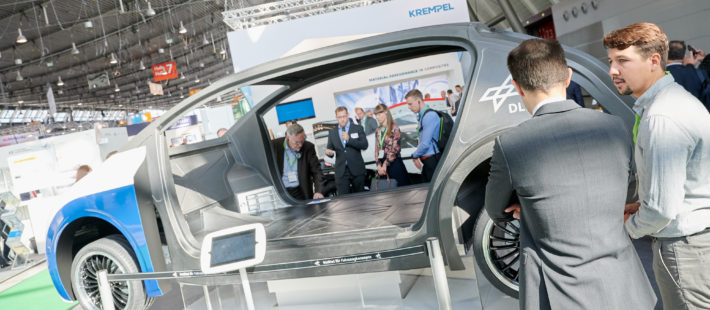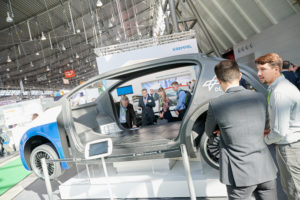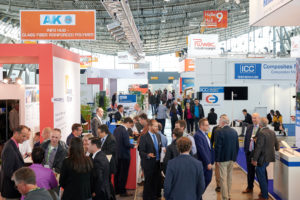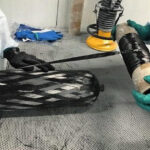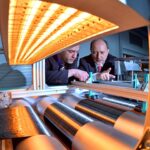Light and darkness are close together in the composites industry right now. This overall economic climate left its marks on COMPOSITES EUROPE, too – positively and negatively. The leading trade fair for fibre-reinforced plastics – sold mainly to customers in the automotive, aerospace, and plant and mechanical engineering industries – suffered from lower demand from both exhibitors and visitors this year. In total, organiser Reed Exhibitions registered 310 exhibitors (prior year: 354) and 7,581 visitors (prior year: 8,148) from 64 countries, a decrease of seven per cent.
Two industries – both key buyers of glass-fibre reinforced plastics (GFRP) – created most of the trade fair’s challenges: the automotive industry, which suffers massively from declining sales and fears trade barriers, and the plant and mechanical engineering sector, where the current economy has similarly depressed the numbers and the mood. Positive signals, meanwhile, are coming from aerospace and increasing demand in the booming construction sector.
“Trade fairs are seismographs of their industries – this is true as well for COMPOSITES EUROPE, which in an economically heterogeneous environment showed its importance for bringing new ideas and innovations to market”, says Michael Freter, managing director of Reed Exhibitions Deutschland GmbH..
European GFRP market stagnates
The same conclusion is reflected in the market report presented in Stuttgart by AVK – Federation of Reinforced Plastics e.V. After years of growth, the market for glass-fibre reinforced plastics in Europe has stagnated in 2019. Total production volume in 2019 is on track to remain flat compared to the prior year, at 1.141 million metric tonnes.
Construction/infrastructure and the transport sector still are the two main application areas for GFRP. The current sales crisis in the automotive sector, which responds more quickly than the construction industry, shows up directly in the market developments expected by the GFRP industry.
“Due to market shifts, the future market prospects of the construction/infrastructure sector must be seen for the first time as greater than those of the transport sector”, says Dr. Elmar Witten, managing director of AVK.
LTF – The interface between metal and fibre-reinforced composite technologies
One of the overarching emerging themes interesting for the entire composites industry is multi-material solutions. Once again this year, the Lightweight Technologies Forum at COMPOSITES EUROPE showed how lightweight multi-material engineering can be implemented in an economic and resource-efficient way – in the automotive industry, aerospace and mechanical engineering.
“In the lightweight construction landscape, COMPOSITES EUROPE and the Lightweight Technologies Forum serve as an important interface for metal and fibre-reinforced composite technologies”, says German Economics Minister Peter Altmaier, underscoring the significance of the forum.
Up next, the 15th COMPOSITES EUROPE will take place in Stuttgart from 10 to 12 November 2020. To celebrate this little anniversary, Reed Exhibitors are already exploring innovative ways of working with partners and exhibitors to stage the trends of the future and generate business.
Source : www.composites-europe.com


